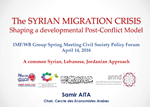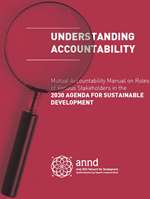Published on Fri, 2016-04-22 12:15
This paper discusses the newly issued World Bank report on the welfare of the Syrian refugees in Lebanon and Jordan, based on the analysis of UNHCR data. It points some significant aspects not addressed, especially the effects Syrian pre-crisis public policies. It highlights the gap between the lack of proper socioeconomic assessment of both refugees’ and hosting communities and the fact that resilience and integration policies are already been negotiated with the Lebanese and Jordanian governments. This is while there no such efforts dealing with Egypt, Iraq and mainly Turkey, who are receiving large numbers of refugees. In addition, the Civil Society organizations are channeling a large share of the humanitarian aid, while they have, as well as the Syrian refugees’ and hosting communities, no proper voice in the debate. |
Published on Fri, 2016-04-22 11:41
The money needed to fight climate change and make the Sustainable Development Goals a reality is hidden in tax havens and stowed away in the pockets of vulture funds, as world leaders gather at the UN to sign the climate treaty and discuss the new goals. |
Published on Thu, 2016-04-21 00:00
A move towards increased transparency and accountability in the private sector should not only apply to extraterritorial obligations, but also be used to fulfill economic and social rights (ESR) domestically. This could very well be done via the Dodd-Frank Act, which sets forth mechanisms that serve not only to fulfill and protect certain rights, but that also provide the legislative framework for third party accountability. These rights include the right to housing, credit, and an adequate standard of living, among others. |
Published on Tue, 2016-04-19 11:30
The importance of international—or even better, global—cooperation on tax issues is becoming more and more evident in the light of tax evasion and avoidance scandals during the last few months and years. Countries in the global North and South were shown to offer preferential treatment to foreigners—from Panama to Luxemburg from the Cayman Islands to Hong Kong. Individuals as well as huge transnational corporations are using a fragmented and inconsistently regulated global system of trans-border taxation to evade and/or avoid taxes. The sums lost amount to hundreds of billions annually. Depending on the model of estimation, developing countries are losing more than one trillion US dollars per year in illicit financial flows, the majority of which can be attributed to the abuse of transfer pricing rules. A panel of the UN Economic Commission for Africa chaired by former South African president Thabo Mbeki estimates the losses of Africa alone at approximately 50 billion US dollars per year. The Organisation for Economic Co-operation and Development (OECD) puts global revenue losses from Base Erosion and Profit Shifting at an annual 100 to 240 billion US dollars. |
Published on Mon, 2016-04-11 10:59
Arab NGO Network for Development (ANND) releases the Mutual Accountability Manual on the roles of Different Stakeholders in the 2030 Agenda for Sustainable Development. This guide provides assisting tools for the civil society to play its role within the framework of accountability of the parties concerned with the developmental process, from the public sector as a key partner in the development process and its basic point of reference in the context of policy-making and ensuring the proper implementation and protection of the rights of the citizens, to the private sector as a partner who is supposed to adhere to international standards of human rights, and the donors who are committed to providing the necessary resources for the implementation of the development process and achieving the goals of civil society. |
SUSCRIBE TO OUR NEWSLETTER







